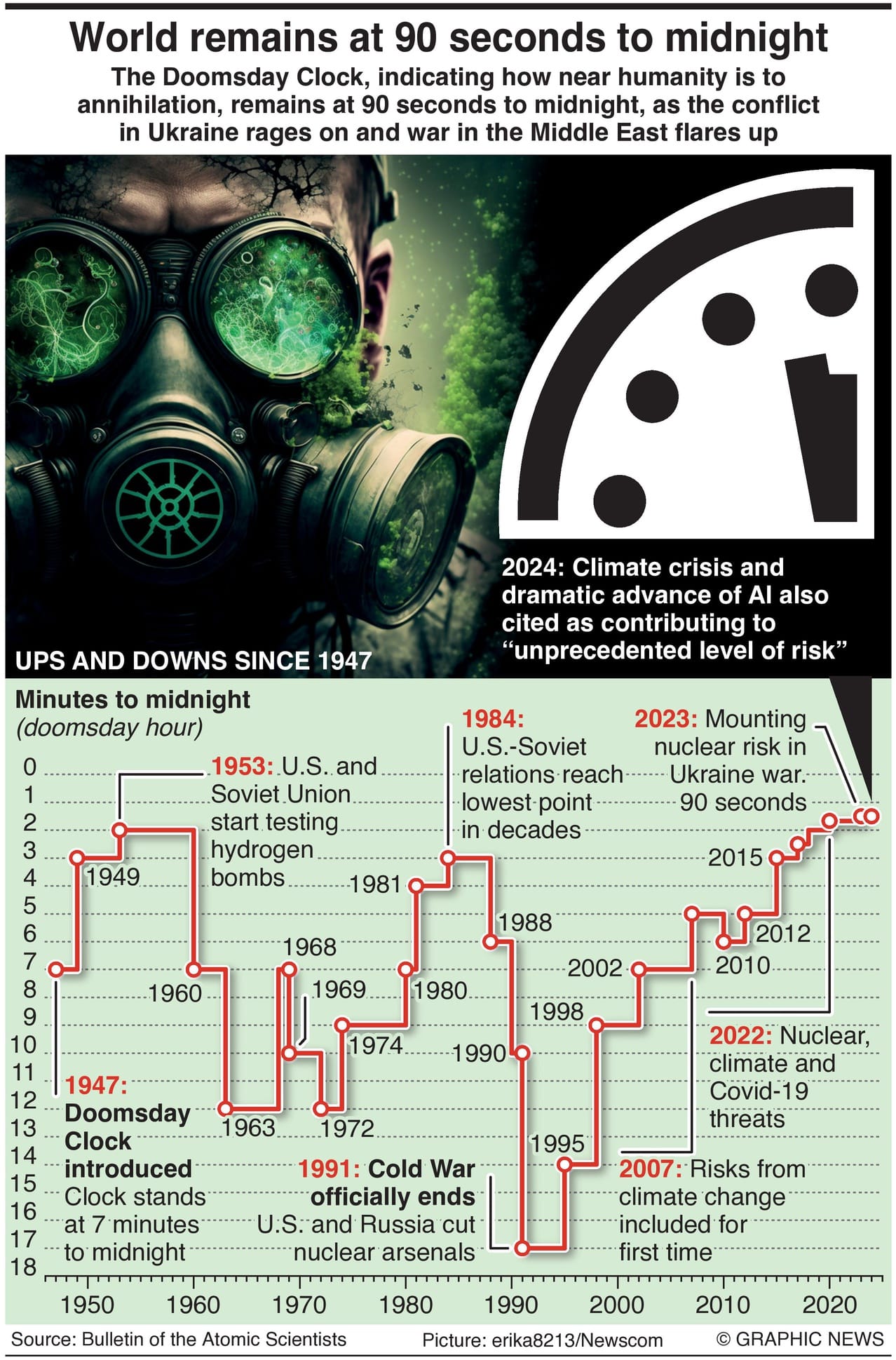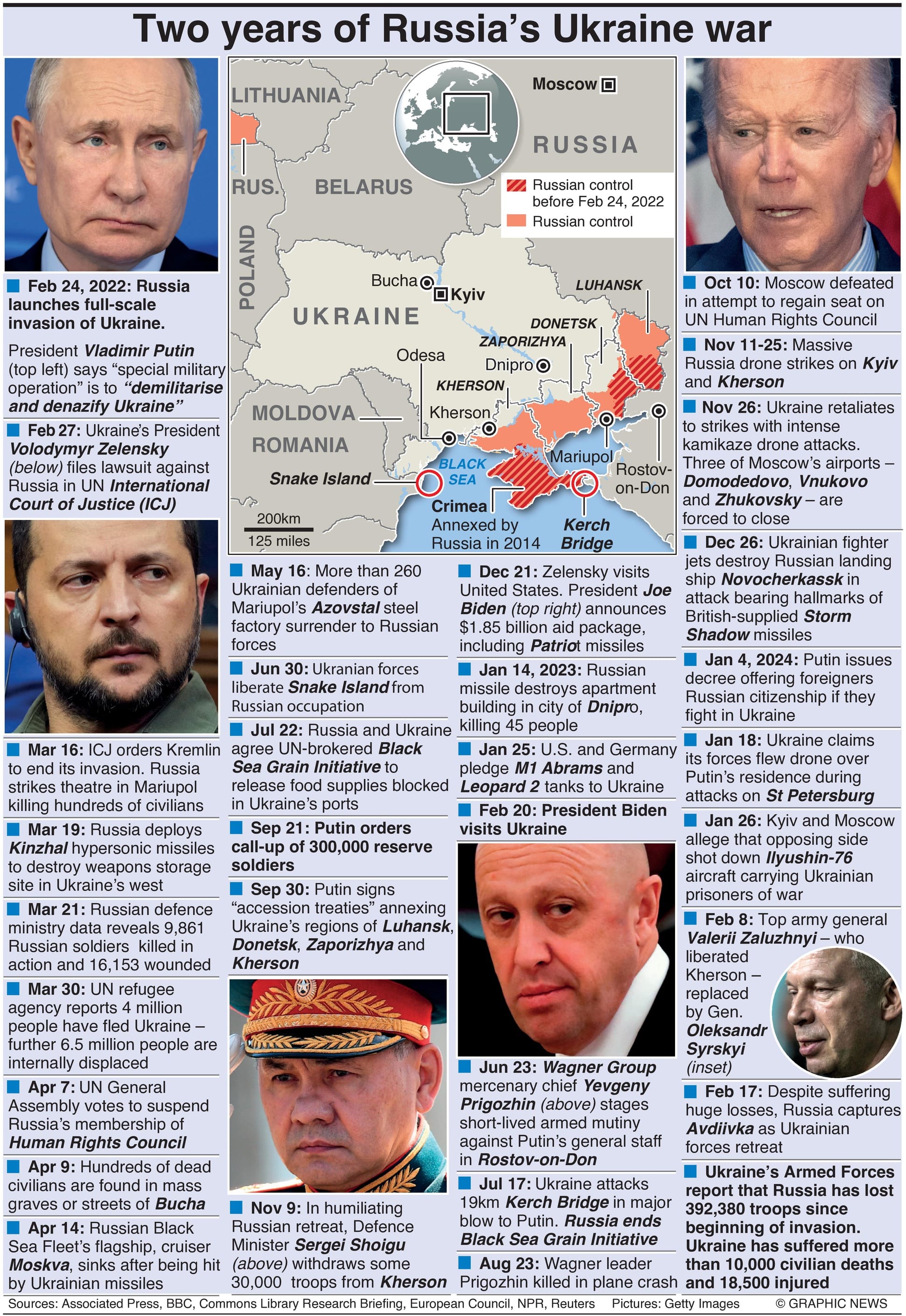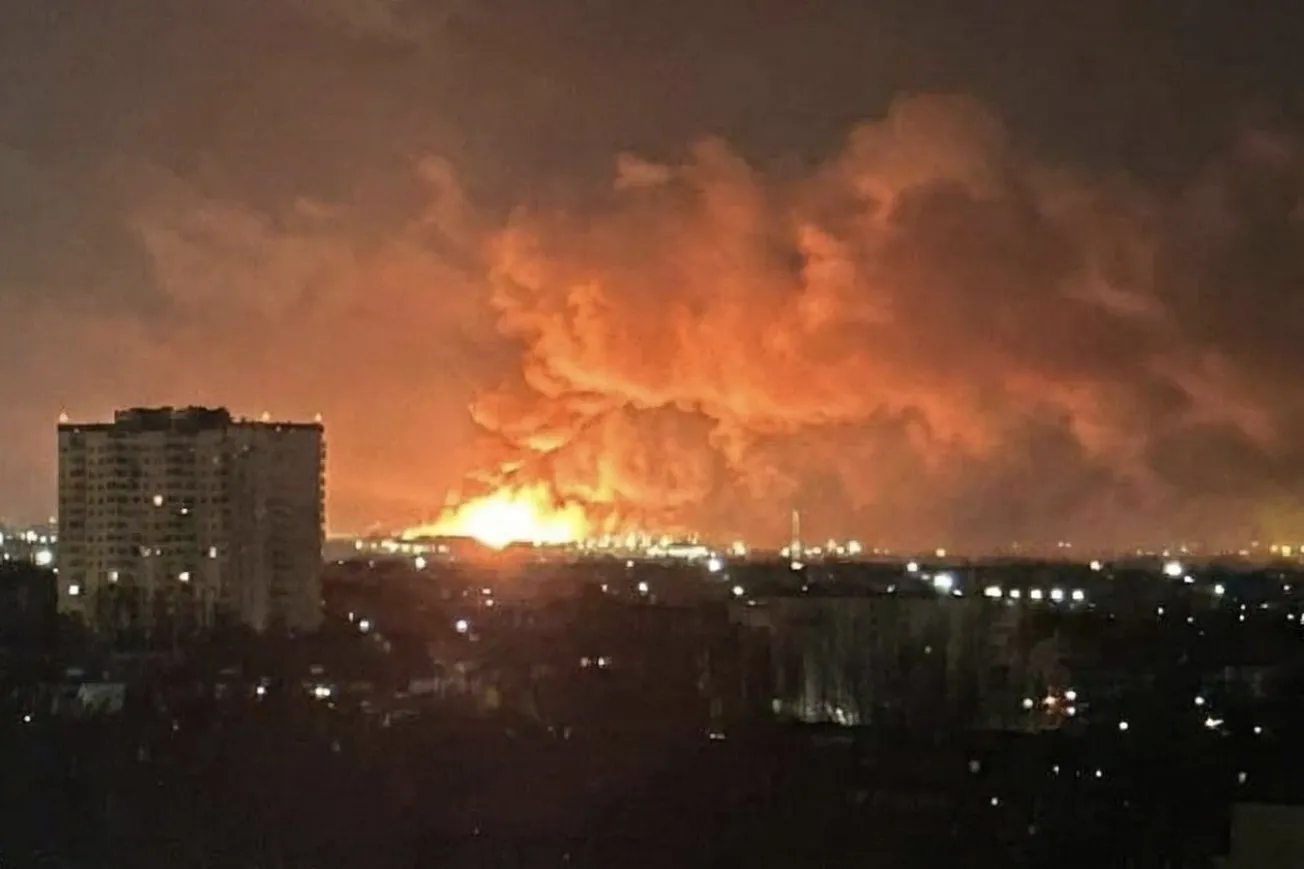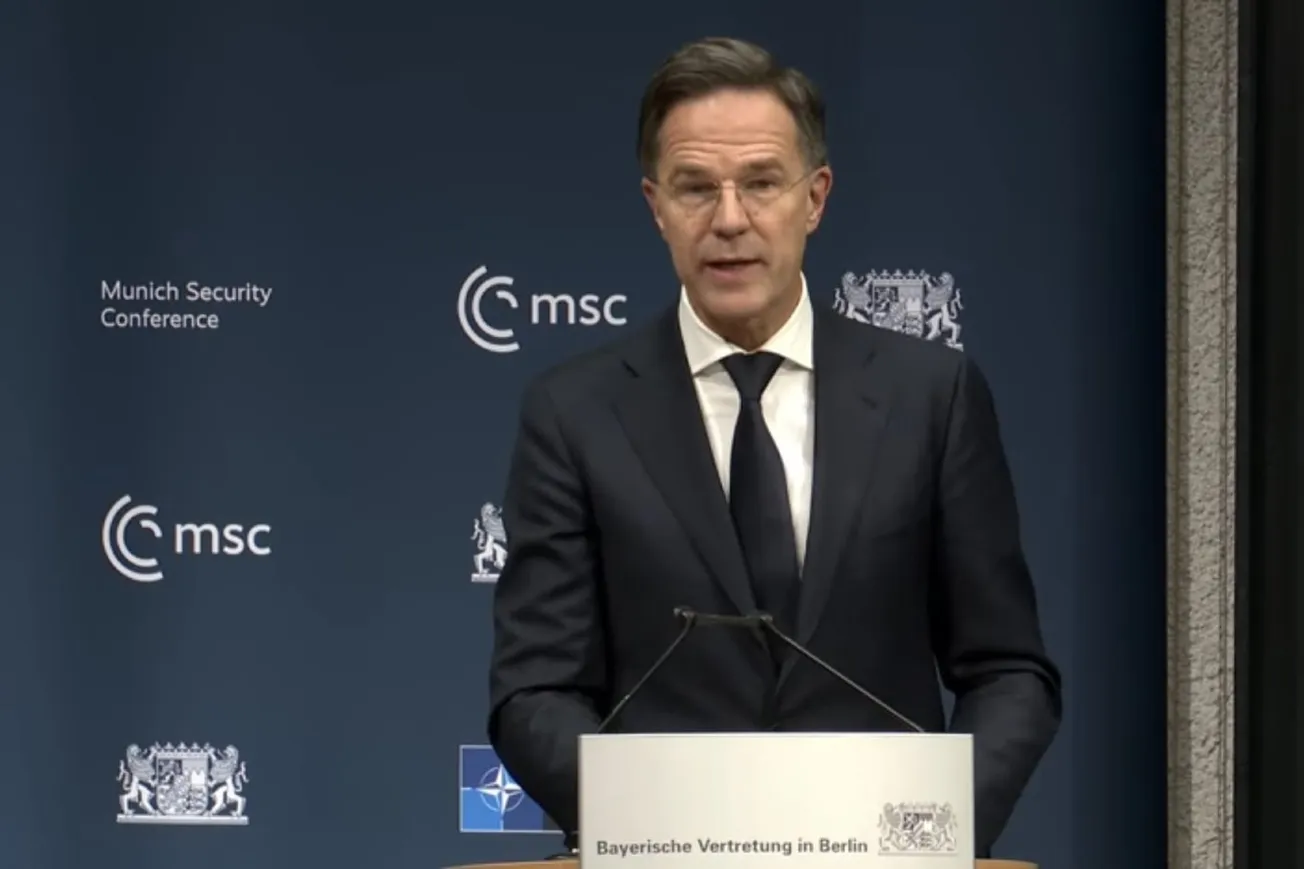It has been two years since Russia, mercilessly and in violation of all United Nations norms, invaded Ukraine. Even though America and the West responded with remarkable and single-minded solidarity not seen since World War II, the cost to human life and suffering in Ukraine and across Europe (and even regions far removed from the conflict zone) has been staggering.
The situation was so severe that there were months when we were edging towards World War III and nuclear confrontation, as the Doomsday Clock dangerously approached the closest to midnight since the 1963 Cuban missile crisis.

On the second anniversary of the Russian invasion, we shall grade America's (and, more generally, the West's) performance across various dimensions.
War performance: D. According to the Harvard Kennedy School's Russia-Ukraine War Report Card in December 2023, Russia currently occupies 25,000 square miles, about 20% of Ukraine, nearly 9,000 square miles more than before the Feb 2022 invasion. [At the war's peak, Russia had occupied almost 54,000 square miles, but Ukraine won 29,000 square miles back]. American and European taxpayers have sent $200 billion in weapons and logistical support to help Ukraine - yet the report card shows that Ukraine has lost nearly 13% more territory than it had when Russia first invaded. The hard truth is that Russia prevailed, and Ukraine and the West lost.

Diplomacy: F. While Russia is 100% percent responsible for triggering the war and deserves universal condemnation and punishment, America helped escalate the conflict. On November 10, 2021, the U.S. and Ukraine did what Russian President Putin had been lobbying against since 2008. Egged on by Secretary of State Antony Blinken and National Security Adviser Jake Sullivan, President Biden entered into a strategic agreement with an entire section devoted to countering Russian aggression that had not yet happened. It outlined how the U.S. would step up weapons delivery to Ukraine. It specified how Ukraine's integration into "Euro-Atlantic institutions are concurrent priorities." The deal was a radical departure from former President Obama's reluctance to engage with Ukraine.
Two months after the war started, both Russia and Ukraine met in Istanbul. They were close to inking a peace deal when then U.K. Prime Minister Boris Johnson, under Biden administration guidance, scuttled it.
Now, sticking to an untenable position that Russia needs to surrender all of its Ukrainian territory and agree to war reparations as a condition for peace talks is not moving the peace needle. In war, losers don't set preconditions for talks. Meanwhile, Russia continues to grind on, taking more territory, as Ukraine finally withdrew from the strategically crucial frontline city of Avdiivka.

American leadership and NATO unity: A. One positive outcome has been the way that NATO has not only remained united but has expanded its membership to countries like Sweden and Finland, a prospect unthinkable a few years ago. Europe, as a whole, is a lot more united, even with countries like Hungary voting to send Ukraine aid. Germany has now committed more than $100 billion to increase military spending. Former President Trump often pointed out that wealthy countries, including Germany, should pay their fair share to defend themselves and their allies, but he was mocked for his "naive" stance. Europe now sees America as such a crucial partner for transatlantic security that even the idea that America could slightly step back brings horror to European capitals.

American readiness for a future direct military conflict: C. The last time that America fought a war was against Iraq in 2003, 21 years ago. Most American soldiers today have no experience in combat, with veterans from the Iraq war having already retired. Even American military leadership is devoid of mid-level officers who have battlefield experience. Shipping billions of dollars worth of American munitions to Ukraine has resulted in depleting American inventories to a dangerous level, and replenishing them may take many years. Part of the issue is that the Military Industrial Complex supply chain still relies on other countries, like China, to export parts and materials to build American weapons. A primary justification for the $61 billion Ukraine aid package from conservative Republicans in the Senate is that it would keep money in America and augment American industrial capacity, manufacturing, and jobs.
The Western sanctions regime: D. While the 2,500+ sanctions on Russia have dented the vast nation, the Russian economy grew at 3.6% in 2023, far outpacing Germany's and the U.K.'s, which, showing two consecutive quarters of negative growth, are in a recession.
For the last 18 months, contrary to corporate media opinions, we have repeatedly noted that imposing sanctions against such a large energy exporter as Russia would fail and be counterproductive. In April 2023, we wrote an editorial on America's sanctions driving countries away from the dollar. The following month, we said Western sanctions are biting the West more than Russia. In late July, we noted that the New York Times, for the first time, acknowledged what we had been saying months earlier. On February 16, the Times again expressed a mea culpa by admitting that sanctions haven't hobbled Russia - and Moscow's continued strength is a humbling result for the U.S. and its allies.
America's dollar weaponization prompted the Global South countries to begin disengaging from America and creating regional alliances like those of BRICS countries. No country wants to be the target of Treasury bureaucrats who can cut off the lifeblood of an economy because that nation doesn't want to play by America's rules.

Western strategy: D. The Western mantra has been that Russia has to be punished for interfering in the sovereign choices of another nation and invading its territory, upsetting the rules of the world order.
However, populations of more than half of the world have refused to buy into this argument. They point out how NATO has been interfering in Russia's security by expanding the alliance to Russia's very borders. Before 1990, dating back to NATO's founding in 1949, the coalition had 16 nations. After the Cold War ended, NATO expanded steadily and now has 31 member countries.
Russia saw an existential threat in NATO admitting Ukraine, a point which drew sympathy from countries like China, India, Brazil, and South Africa. Besides, these countries saw Western hypocrisy when the West helped engineer regime changes in Kyiv in 2014. As we have noted, America has been interfering in Ukraine since 2007.
By not uniting the world against Russia, which continues to be the supplier of critical raw materials and military and civilian industrial technology to numerous countries, the West has failed. It portends tough times ahead for organizing a global outcry should China attack Taiwan because the wolf has already cried out too many times.
Against this backdrop, the United States Senate, the Biden administration, and countries at the Munich Security Conference are all pressuring the GOP House to pass the $61 billion Ukraine aid bill to continue the fight. The average age of the Ukrainian soldier is reported to be 42+. The brave Ukrainian soldiers are exhausted beyond description. Ukraine has been facing the worst mobilization issues since the beginning of the war. There are not enough able-bodied men to fight, even as Russia draws into its reserve of soldiers after its mobilization drive during the war.
The world sees the folly and asks why America, already nursing a debt of $34 trillion and struggling to service it with annual interest payments exceeding $1 trillion, doesn't want to negotiate peace.
As we now enter the third year of a grinding war that appears to have no end in sight, all we can hope is for wiser counsel to prevail.
Related Reading Recommendations
Updated Ukraine Recovery and Reconstruction Needs Assessment Released – European Commission
Ukraine Can No Longer Win - RealClearDefense
Ukraine outnumbered, outgunned, ground down – The Economic Times







